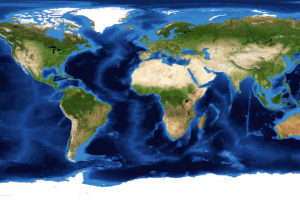U.S. Power, Influence Seen as Greater Threat than Russia, China

(Voice of America – voanews.com – February 11, 2019 – Jeff Seldin – voanews.com/a/us-power-influence-seen-as-greater-threat-than-russia-china/4782226.html)
More people around the world worry about the threat posed by the United States’ use of power and influence than they do about similar threats from Russia or China.
The finding, part of Pew Research Center’s Spring 2018 Global Attitudes Survey, found a median of 45 percent of more than 27,000 respondents in 26 countries view U.S. power and influence as a threat, compared to 37 percent for Russia and 35 percent for China.
The list of countries most likely to view the U.S. as a threat is topped by two key allies in the Asia-Pacific: South Korea and Japan.
In South Korea, 67 percent of respondents listed the U.S. as a threat. In Japan, it was 66 percent.
Mexico was third, with 64 percent of respondents calling U.S. power and influence a major threat. Previous Pew surveys found views of the U.S. in Mexico nose-dived following the election of U.S. President Donald Trump in 2016.
Data published by Pew in October 2018 found 6 percent of Mexicans expressed confidence in Trump’s leadership, due in part to strong opposition to his plans to build a wall along the U.S. border with Mexico.
In another four countries – Tunisia, Argentina, Brazil and Indonesia – more than half of the respondents viewed U.S. power and influence as a threat.
And 49 percent of respondents in France and Germany saw the U.S. as a threat.
Pew researchers call the increased wariness of the U.S. the biggest change in sentiment of all the threats tracked by the survey.
In 2013, about 25 percent of survey respondents from 22 countries saw U.S. power and influence as a threat. But by 2017, following Trump’s election, that had risen to 38 percent.
U.S. security policy under Trump has emphasized what officials have described as a new era of great power competition, labeling Russia and China top threats to the U.S. and the world.
During his first day on the job, acting U.S. Defense Secretary Pat Shanahan said his top concern was, “China, China, China.”
But based on the results of the survey, many people around the world are not convinced.
Poland was the only country where more than half of the respondents saw Russian influence and power a major threat.
Respondents seem to be more worried about China, though only in four countries did more than half of the respondents see China as a danger.
A median of 82 percent of South Koreans surveyed viewed Chinese influence and power as a major threat, followed by 69 percent in Japan, 56 percent in the Philippines, and 51 percent in Australia.
In the U.S., 50 percent of the respondents viewed Russian influence and power as a threat, compared to 48 percent who felt the same about China.
Late last month, the U.S. intelligence community’s annual Worldwide Threat Assessment report warned of waning U.S. influence across the globe, even among allies, with Russia and China seeking to fill the void.
Many U.S. allies, the report said, are “seeking greater independence from Washington in response to their perceptions of changing U.S. policies on security and trade.”
The Pew survey of 27,612 people in 26 countries was conducted between May 14 and Aug. 12, 2018.
It listed the top perceived threats as climate change, the Islamic State terror group, cyberattacks and North Korea’s nuclear program.
